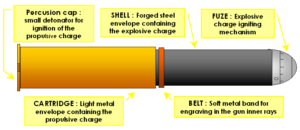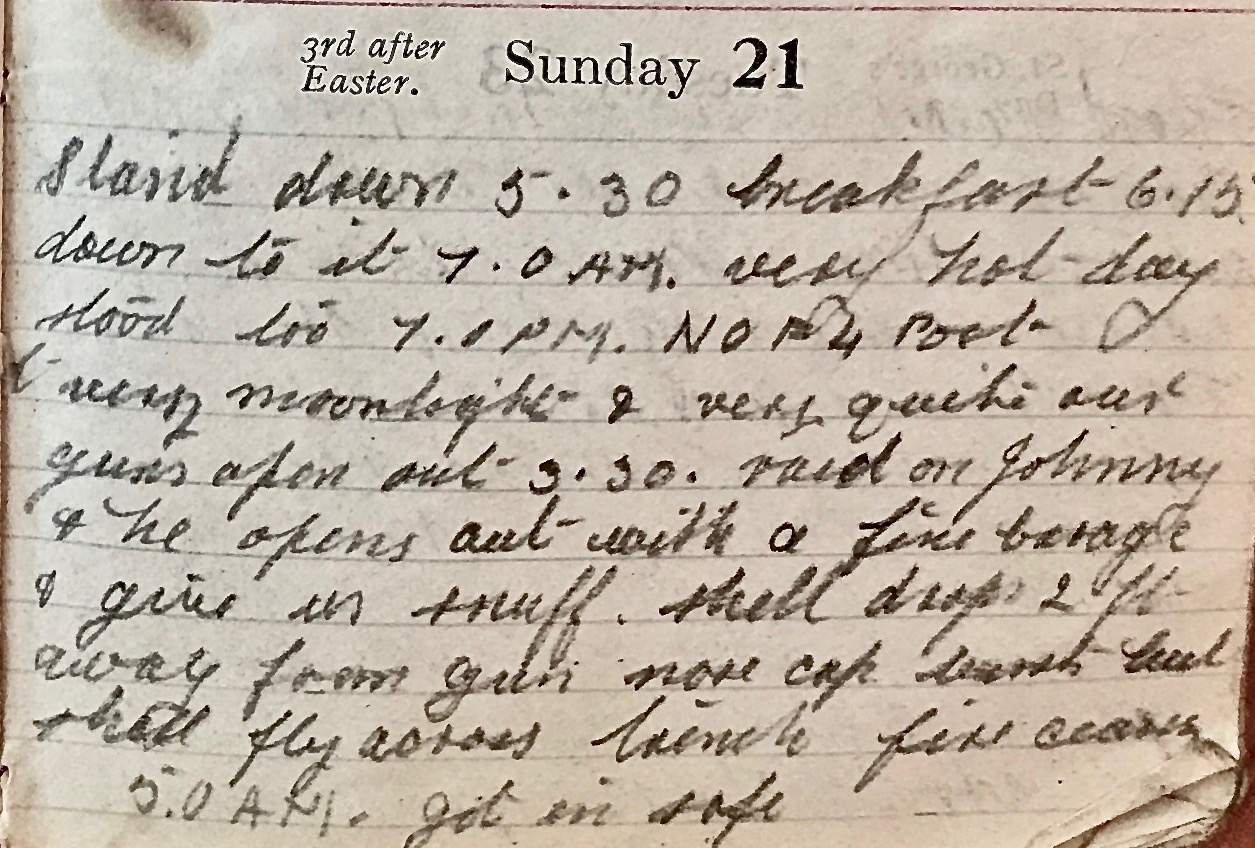Sunday April 21st, 1918
Stand down 5:30. Breakfast 6:15. Down to it 7am. Very hot day. Stood to 7pm, number F4 post. Very moonlit and very quiet. Our guns open our 3:30 raid on Johnny and he opens out with a fine barrage and gives us snuff. Shell drops two feet away from gun, nose cap bursts but shell fly across trench. Fire ceases 5am. Got in safe.
Shell Fire

This is reported in tomorrow’s Battalion Diary and Frank’s today. It seems like Sector 4 is engaged in a fire fight with Johnny. According to Frank, the British open up and Johnny retaliates. The exchange lasts about 90 minutes. A shell drops two feet from Frank’s Machine Gun post. Luckily the nose cap bursts but the shell, which contains the explosives, flies across the trench causing no damage.
The diagram shows a German 7.7cm shell.¹ The ‘nose cap’ described by Frank is the ‘fuze’ which triggers the shell’s explosion either through a timing device or upon impact. In the first couple of years on the Western Front, impact-detonating shells often failed to explode because of the mud and churned-up, soft earth. This ‘flaw’ was later corrected. Unfortunately in Macedonia, the ground was rocky and fairly untrammelled, Frank and his team definitely ‘dodged a shell’ today.
In the Line of Fire
Everyone’s reaction to shell fire is understandably different. The following extracts are taken from the fascinating and thoughtful memoirs of an Australian doctor, Eric Payten Dark. Qualifying as an MD in 1914, Doctor Dark served with the RAMC, first on the Western Front, where he received the Military Cross, and later in Macedonia.
‘The night was unusually quiet until about midnight when a tremendous bombardment began with 5.9s, a very destructive shell, pouring into the trench. Father Knapp and I lay flat in the little aid post which was strong enough to stop fragments, but nothing more; he hated to lie in the dark, so every time the blast blew out our hurricane lantern I lit it again, so I seemed to spend most of the time striking matches. The shelling went on for half an hour, and then stopped abruptly. Bn HQ was a little in front of our trench, and they counted the shells as they came over – a steady stream at 30 a minute, so in the half hour 900 fell in or around the trench.’²
That evening there were to be four periods of shelling, each lasting about half an hour.
‘In the middle of the third half of the bombardment I decided to walk along the line of shell holes that had been a trench and see what was happening. When I was about half way along I suddenly felt that 1 was utterly alone in that mad world of bursting shells and flying fragments, and had a few seconds of blind panic, and started to run; I took about ten paces, then suddenly realised that I was a bloody fool, being just an likely to run into a shell as away from it. Luckily there was no one to see my moment of panic. I have been scared several times after that but never again had such a horrible feeling of sheer terror.’²
13th (Service) Battalion War Diary – 21st April 1918 – Crow Hill
Our artillery moderately active. A special bombardment of Little Dolina took place in the afternoon about 200 rounds of 6 inch HE being fired. Enemy artillery was very quiet. Our planes patrolled the enemy’s lines at intervals throughout the day. Enemy planes were seen over the 26th Divisional front in the forenoon. Between 15:00 and 18:00 hrs two enemy planes flying very hight passed over Horseshoe, White Scar, P41/2 and thens to the Vardar.
2Lt J Schofield and 25 OR proceeded with a Lewis Gun through Dautli village to point 11875/18130 on left bank of Selimli Dere, where they lay up for one hour with the object of listening for and waylaying any hostile patrol. Voices and transport were heard from direction of Dugout Hill at 22:30 hrs. Nothing else was seen or heard of the enemy. The approaches to Dautli do not appear to have been used recently. A fair amount of movement was observed in the early morning and in the evening on Devedzelli Spur, west slopes of Spotted Dog and on Devedzelli Hill. The brass band mentioned before was again heard in the same direction. From 21:00 to 22:00 hrs there was a heavy bombardment on the West of Vardar.
References & Further Reading
¹ ‘WWI military and technical documentation‘ on Passion & Compassion 1914-1918
² ‘The Military Memoirs of Captain E.P. Dark. 1915-1919‘ by EP Dark, copyright his son, John Oliver Dark
* image from above mentioned article, may be subject to copyright


